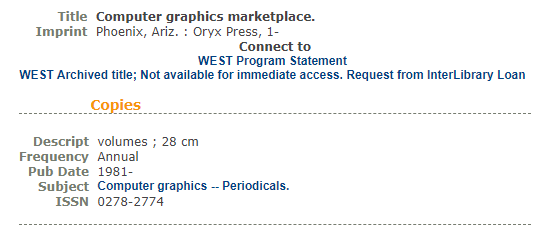Spotlight on AGUA Development: Enhancing Local Discovery of Shared Collections
One of WEST’s major program goals is, of course, preserving the print record to ensure the ongoing availability of these materials for current and future scholars. But how do scholars find those materials if they’re held by other WEST members? How can WEST members help their local users access them? One of the AGUA Development Phase 5 projects offers a first step in answering these questions by creating a way for WEST members to bring the WEST archived collections into their local systems for public display or local staff analysis. In this project, the AGUA technical team built MARC records for the titles archived by WEST members, starting with bibliographic data and adding in information about the archiving institution and the specific holdings that are archived for WEST. The records were then packaged in a .mrc file, which is downloadable from the AGUA interface. WEST members may download this file and load the records into their local system.
To illustrate the end result users see, Mount Saint Mary’s University offers an excellent example:

With these WEST records displayed in their local catalog, MSMU users can now find more materials related to their research without having to use an external system. The records include a link to MSMU’s ILL request form, streamlining and simplifying the request process by embedding the form link at the point of need. The records also contain a link to the WEST Program Statement, helping clarify the shared status of these titles and educate users on the benefits of their institution’s participation in the WEST collaboration.
Another application of this development is to use this dataset to perform local collection analyses and compare local holdings against the WEST archives. Ingesting these records provides an opportunity for members to identify locally held titles duplicated in the WEST archives, and to identify important local titles not yet retained in WEST that could be voluntarily archived.
Of course, having records for titles not held locally may not be an ideal solution for all members. WEST and several other peer programs are in discussions with library service providers to advocate for enhanced support for discovery and sharing of shared print materials in their platforms. This dual approach allows WEST to provide an immediate solution for helping local users discover titles they have access through their institution’s WEST membership while also continuing the work to build systems that reflect the increasing interconnectedness of collections and support the discovery and access in ways that make shared collections actionable by and valuable to members and their users.
